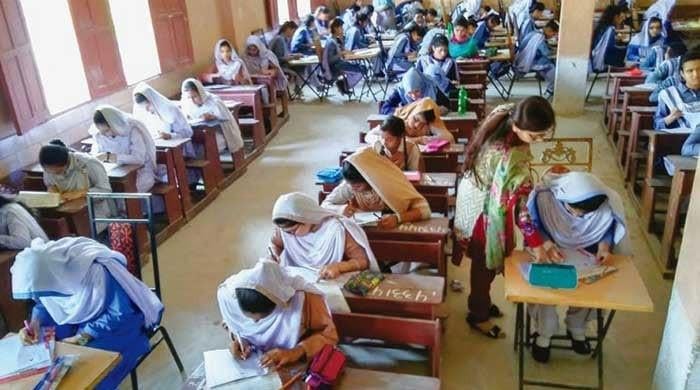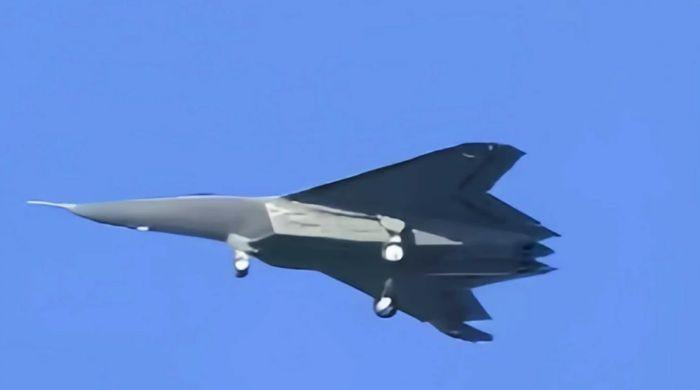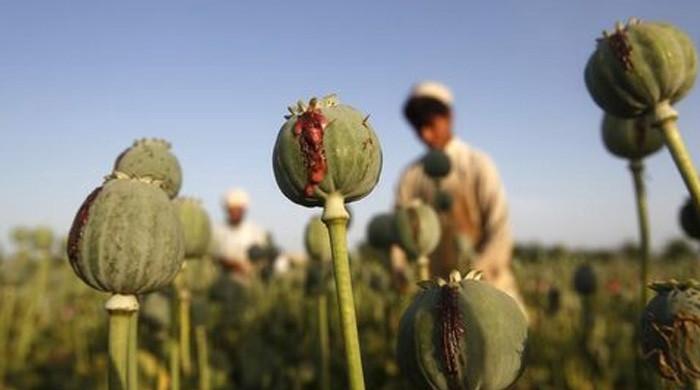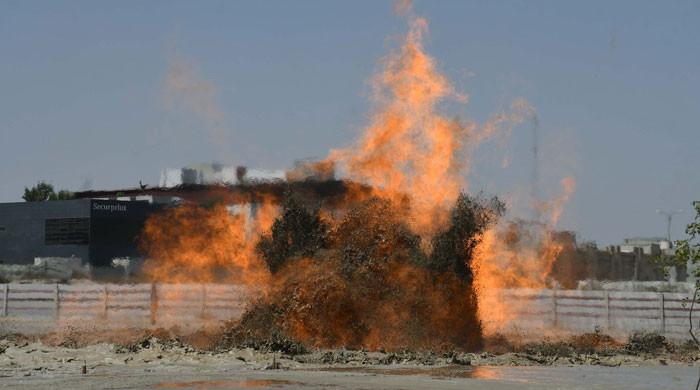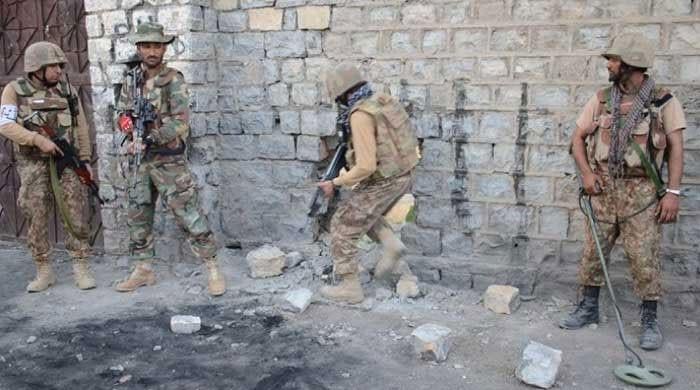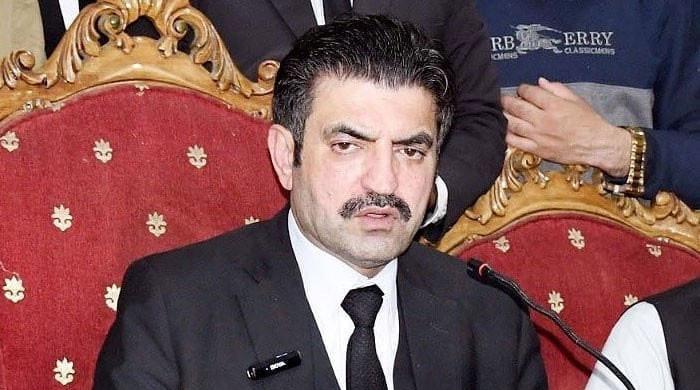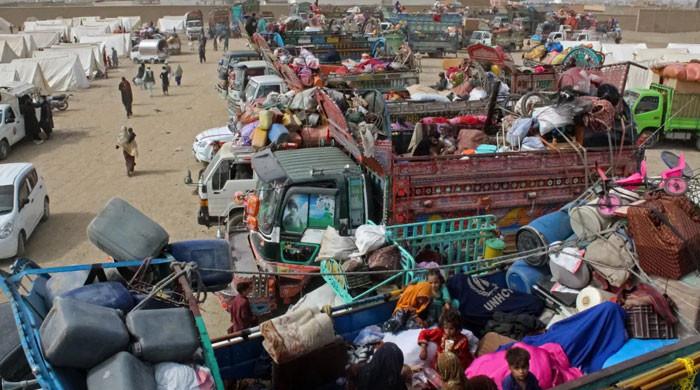PM, COAS agree to not use force to disperse Islamabad protesters
The two discussed the sit-in being held on the Faizabad Interchange
November 26, 2017
ISLAMABAD: Prime Minister Shahid Khaqan Abbasi and Chief of Army Staff General Qamar Javed Bajwa agreed that force will not be used to disperse protesters in Islamabad during a high-level meeting on Sunday, sources told Geo News.
The operation launched on Saturday to disperse protesters at the Faizabad interchange in Islamabad was suspended at approximately 2:30 PM local time. Following the operation, protests were started in major cities of the country.
During the meeting, the two officials exchanged views on the matter and tried to formulate a plan of action.
The two officials discussed the issue of whether firearms should be used by army personnel. In its order, the Islamabad High Court (IHC) "restrains [the] use of 'firearms' during clearance operation", as per Item 8 of its "judgment of writ petition number 3914 of 2017".
The COAS affirmed that that the army will act according to the law and Constitution of the country, sources added.
Both officials agreed that the issue should be resolved in a peaceful manner.
The COAS also expressed concern over restrictions placed on TV news channels and suggested that the prohibition be removed, sources said.
The army chief also suggested that the findings of the Raja Zafar-ul-Haq committee should be made public.
The army chief was on a visit to the United Arab Emirates and cut short his trip to reach the country last night, sources said.
General Qamar Javed Bajwa also spoke with Prime Minister Abbasi regarding the sit-in in Islamabad on Saturday.
“COAS telephoned PM. Suggested to handle Isb Dharna peacefully avoiding violence from both sides as it is not in national interest and cohesion,” Major General Asif Ghafoor — the director-general of the Inter-Services Public Relations (ISPR) — tweeted on Saturday.
PM chairs high-level meeting
Earlier, Prime Minister Shahid Khaqan Abbasi chaired a high-level meeting to evolve a strategy to tackle the situation in the federal capital and other parts of the country following the launch of an operation.
The meeting chaired by the prime minister was attended by Punjab Chief Minister Shehbaz Sharif, Interior Minister Ahsan Iqbal along with district administration and police officials from the twin cities.
Earlier, Prime Minister Shahid Khaqan Abbasi and Punjab Chief Minister Shehbaz Sharif met to discuss the situation and deliberated over ways to achieve a peaceful resolution.
Govt orders Army deployment
The Ministry of Interior issued Saturday night a statutory regulatory order (SRO) to authorise the deployment of the Pakistan Army to aid civil power to control the law and order situation in the Islamabad Capital Territory.
The SRO — issued in light of the request of the Islamabad Capital Territory Islamabad Administration, dated November 25, issued by the ministry under Article 245 of the Constitution, read along with Sections 4 and 5 of the Anti-Terrorism Act and section 131-A of the Cr.P.C — authorized "the deployment of sufficient number of troops" as "to be determined by the Commander 111 Brigade" in effect from November 25 until further orders.
In response, however, the Pakistan Army said while its troops are "fully ready to perform the assigned task in line with its institutional obligations", there are "few aspects meriting deliberation prior to the deployment".
The police force "has not been optimally utilized to its full capability" in "dealing with [the] protestors", the Army noted.
In addition, "Pakistan Rangers, backing […] police as 2nd tier force physically deployed with police in Islamabad, have not been given written instructions as agreed for their employment."
The Army added that its troops are "traditionally not just used for dispersal of crowd/protestors but to quell commotion".
Therefore, their deployment "needs to be clarified in the context of item 6 of Supreme Court judgment dated November 23, 2017, with regards to civil petition no 2983 of 2016 (Sher Jamal and others vs Wali Sardar and others)".
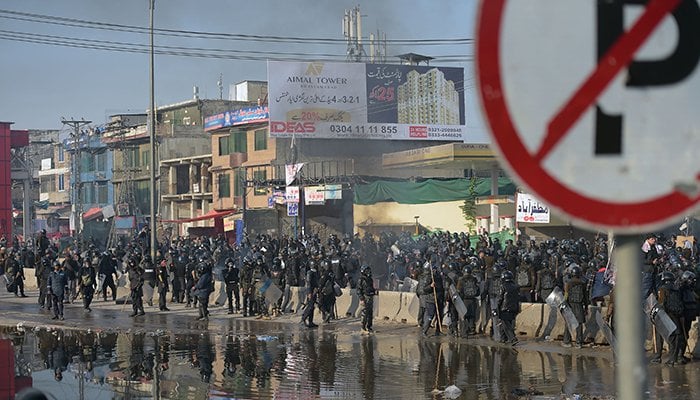
Islamabad operation
The operation that had commenced early Saturday morning to clear Faizabad Interchange from protestors staging a sit-in was put on hold later in the day — suspended at approximately 2:30 PM local time, according to reports.
The situation, nevertheless, remains tense in the federal capital. Protests in various parts of the country have also erupted after the operation started.
The protests are being held against the change in the finality-of-Prophethood oath in the law when the government passed the Elections Act 2017 last month.
The change — dubbed a clerical error by the government — was immediately fixed as an amendment was passed later.




